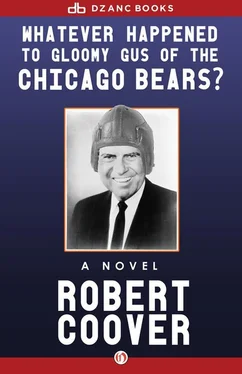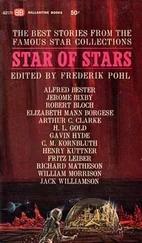Around us meanwhile the party was in full swing, and I was soon swept into it again, heating up food, rinsing forks and glasses, bringing in the ice I’d been making in buckets in the backyard and chopping it up with one of my sculpting chisels, joining in the songs (“ Solidarity forever! Solidarity forever …”) and hugs and conversations, the laughter and shouting. “Salud, Meyer!” “Salud, Ilya!” I felt an unbelievable intensity welling up about me, even when the chatter was about nothing more serious than chainletters and chicken factories, Charlie McCarthy or Chick Webb…
“… In our hands is placed a power greater than their hoarded gold;
Greater than the might of armies, magnified a thousand-fold .
We can bring to birth a new world from the ashes of the old .
For the union makes us strong!
Solidarity forever!
Solidarity forever…!”
There was a lot of talk about Spain, of course, about art and theater and music, writing, film, swing bands, politics, all the things these friends of mine were not only interested in, but working and living with every day. I thought: These are the most beautiful people in the world, I’m lucky just to be able to have them around me! “You will eat, by and by!” they sang, crowding up around the overloaded trestle table.
“The change from a handicraft mode of production to the machine age has alienated and isolated the artist,” Simon was saying over the noise, holding up the unfinished torso of a quarterback throwing a forward pass, “Meyer is fighting this alienation with his welding, don’t you see, humanizing, as it were, the industrial product…”
“No shit…”
“… Work and pray, live on hay,
You’ll get pie in the sky when you die!”
Simon took up a collection for the Brigade before he left, and Golda promised Maxie to keep a steady flow of cigarettes and warm socks coming to him in Spain, as she was already doing for Dave and the others. We drank to that. We were drinking to everything. And eating. And talking. “Hell, that guy’s got the imagination of a goddamn mirror,” someone said and winked at me. “Where’s the mustard?”
“Hold, Madrid, for we are coming,
I.B. men be strong…!”
Father Divine was mentioned, Mother Bloor, test-tube babies and Baby Snooks. “What I’m sick of is art as a kinda jazzy framed wallpaper for rich cats!”—this was O.B., his voice intense but his soft brown face smiling serenely: “Art’s gotta go public, baby!” I think we were talking about a New Masses article on the Ash Can School of American art, but at the same time all around us people were joking about O’Neill’s Nobel and Paul Muni’s Oscar (“Imagine! Our own little Muni Weisenfreund!”), endorsing Sal Hepatica (“One dose, honey, and I was relaxed as twilight!”) or arguing about John L. Lewis as Working-Class Hero or capitalist lackey or next President of the United States or the driver of a Cadillac V-12, and it was all getting mixed up, deliciously mixed up. “Sure, times are better,” Leo was saying, tugging on his long mustaches. “Sure, there’s more money around. You used to only get forty dollars to beat up a worker a couple of years ago. Now it’s sixty, and for breaking his legs a bonus and a paid vacation!”
“Come, Workers, sing a rebel song,
A song of love and hate;
Of love unto the lowly and of hatred to the great…”
By now, the wine was beginning to taste very smooth, in fact it had no taste at all, and when O.B. offered me his reefer, I took a deep puff without even coughing. “Wow, it’s like A Night at the Opera in here!” O.B.’s girlfriend laughed, as someone bumped her up against him, and I laughed with her. Then it seemed I couldn’t stop laughing. When the Black Baron wandered in and Harry asked him in a corny Baron Munchausen accent, “Vot you tink, Sharlie, all dis pipple?”, I couldn’t even keep my feet, but fell giggling to my knees. Thérèse, infected by my giddiness, bugged her eyes at me, gapped her mouth, and sang out: “Aw, I once was as pure as a lily, an’ nobody called me no cow…
“Mah booty was sweet as a rosebud,
But lookit the dam’ thing now—!”
And— “Woops!” —she tossed her paper skirts over her head. We were all laughing by then. “Hey! Ain’t dot luffly?” “Hee hee!” I was rolling around, unable to stand, feeling wildly silly but wonderful. “Meyer, you goofy ass,” Jesse laughed, baptizing me with a spray of whiskey, “you oughta git drunk more often!” It was around then, or maybe a little after, it’s all a bit confused, that I danced my kazatzke . And it was some time after this, hours maybe, long after midnight certainly, when most of the people had left, that I found myself sitting on the concrete floor of my barnlike studio with those close friends remaining (I’d spread some dusty old canvas for everybody to sit on, or seemed to have, maybe someone else did this), huddled in our overcoats, listening to Jesse sing old folk songs, new union songs, joining in when we knew the words or thought we did:
“A redheaded woman took me out to dine ,
Says “Love me, baby, leave your union behind.”
Get thee behind me, Satan, travel on down the line .
I am a union man, gonna leave you behind.”
Harry knew some old Yiddish songs from Poland and O.B. some country blues — I especially remember one called “The Broke and Hongry Blues”—which he claimed to have learned from some blind guy with a peg leg. I’d found a tattered stocking cap for my head, had stuffed some newspapers — Hoover blankets, we used to call them on the road — inside my shirt, I was feeling very warm and happy. The bottles had been emptied, though I still clutched my wine bottle in one hand, licking at the neck from time to time as though to hold back sweet time. I really didn’t want it to end. In my other hand, I held a little Hasidic dancer, whittled from wood, the first piece of sculpture I ever did — someone had asked to see it earlier in the evening (maybe it was this that had led to the dance, or else followed it), and I hadn’t let go of it after. It was, I suddenly understood, huddled there on the floor, an image of my father, though I have no memory of him, and as far as I know he never danced, nor followed Hasidim.
Past Jesse’s head on the broad south wall, my mask of Maxim Gorky, made of welded bits of scrap metal and nearly ten feet tall (all that my warehouse ceiling permitted and more than the door allows), was taking shape. The wide forehead with its peasant hairline and deep worry lines, the high cheekbones, drooping mustache: these parts, though still incomplete, could be made out now and understood. By coincidence, I’d been reading — and been much moved by— My Universities when Gorky died last year, and I had thrown myself impulsively into the project, thinking: This is worth a lifetime. I’d thought I was ready for it, felt sure I had the skills now, the insight, the right relationship. I hadn’t reckoned, however, with the eyes. Hundreds of sketches were stuck up on the wall around the face, hundreds more had been destroyed, and I hadn’t got the eyes right yet on one of them. Those wise, piercing, compassionate eyes of Maxim Gorky, who cannot see enough of life. The old wounded eyes of Alexei Maximovitch Peshkov who has seen too much. In my imaginings, I could picture the entire face down to its least detail, but could only see deep empty spaces where the eyes should be. But tonight, I thought, tonight, if I weren’t so drunk, I might almost be able—
“Hey, Meyer,” Leo was saying, “let’s fix some coffee and build a fire in your stove.”
Читать дальше












